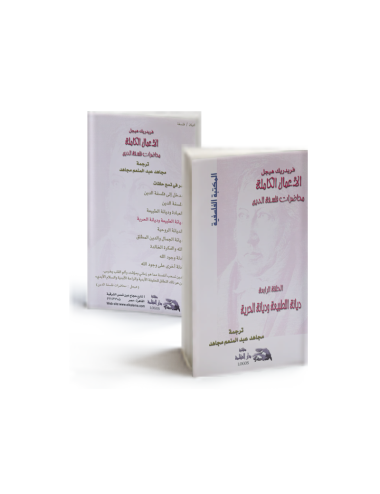History of Aesthetics
Man creates masterpieces of literature and art, but he does not want to be satisfied with this, but rather he wants to understand what is behind his creativity.
0.142 kg - 950 kg
Man creates masterpieces of literature and art, but he does not want to be satisfied with this, but rather he wants to understand what is behind his creativity.
This book is an attempt to define the public assets of individual psychology. It is at the same time acts as a display for the practical application of these principles, the individual continues daily, not only with the world or those around him, but with the organization for his personal life as well..
The higher is also the deepest, and in it the separate moments are grouped together in the subsequent pigmentation of the subjective unity, the need for the interconnectedness that characterizes directness is eliminated, and the separate moments are returned to the subjective unity.
For Hegel, thought is not philosophical if it is not also religious. Both religion and philosophy have a common object and share the same content, for both are concerned with the inherent unity of all things. Hegel's doctrine of God provides the means for understanding this fundamental relationship. Although Hegel stated that God is absolute Spirit and Christianity is the absolute religion, the compatibility of Hegel's doctrine of God with Christian theology has been a matter of continuing and closely argued debate. Williamson's book provides a significant contribution to this ongoing discussion through a systematic study of Hegel's concept of God.
The normal, eternal, absolute idea - in its eternal existence - in and of itself - is God in his eternity or eternity before the creation of the world, and outside the world.
The main characteristic here is subjectivity as a self-determining force - and this subjectivity and rational power that we have met before in the form of the one who has not yet been defined within himself and whose goal - as it appears in the realm of reality - is in this the most specific thing possible.
The separation of religion from the subject manifests itself in the emergence of an actual will. In the will I am an actual and free being, and I present myself against the subject as another, in order to represent it with myself by removing it from that state of separation.
And what after God has honored me, by virtue of my profession as a psychiatrist, with more than half a century of experience, is it right for me to keep all this to myself? As I offer my knowledge and experience to my patients - and as much as possible - I have resolved to present all this in a book, which is a mutual conversation between me and the other party, which is you, the generous reader, so that you may benefit from it by the grace of God, and perhaps also benefit those around you.
The world houses people equally with natural things. When the world is thus treated as a gathering or even a gathering of natural things, it is not conceived as nature, and we do not understand that it is something that is in itself a holistic system, a system of regulations and arrangements, especially laws.
This is the first of two volumes of the only English edition of Hegel's Aesthetics, the work in which he gives full expression to his seminal
This was a very pastoral, insightful book on the emotional/psychological factors that can leave a person wrestling with deep doubt regarding the truth of Christianity - either those who do not call themselves a Christian but would like to believe, or those who do consider themselves a Christian but experience deep distrust and disbelief at times.











